Weihenstephan Brewery Tour
 Tuesday, June 18, 2013 at 6:00
Tuesday, June 18, 2013 at 6:00 Our friends from Atlanta came to visit -- so we drove to Salzburg and the boys trained in Munich's Olympic pool.
One other request they had was to get a brewery tour. Frau A and I have toured a Bavarian microbrewery,
and a mid-sized brewery (both in "hopfenland" in northern Bavaria), but had not yet toured a brewery in Munich.
We blogged a bit about Weihenstephan before... first when we heard that they were collaborating with Sam Adams in the U.S. to brew a champagne beer, and then when we procured a bottle of "Infinium" and taste-tested it.
Things worked out just right: they had only a morning on the last day before their flight out, but the Weihenstephan brewery had a morning tour -- and the brewery is located only 10 minutes from the airport!
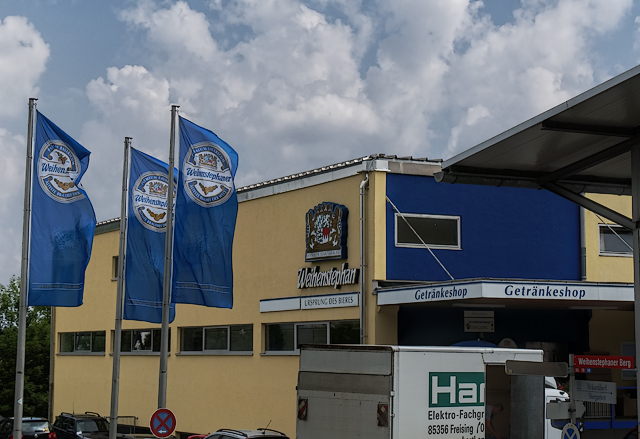
First, Weihenstephan deserves some background. We served their helles at our wedding, and we wrote/printed a handout for our guests at the reception that gave some background about the brewery's history and the beer:
"Weihenstephan makes a credible claim to be the oldest continuously-operated brewery in the world.
The formal brewery was established in 1040, about 972 years ago! It has survived four fires (where it burned to the ground), three plagues, various famines, an earthquake, and being plundered during the 30 Years War and War of the Spanish Succession. It has evolved from a monks' brewery, to the Royal Bavarian Brewery, and today is owned by the State of Bavaria (so they are only allowed to use Bavarian ingredients - water, malt, and hops, plus their secret strain of yeast). Weihenstephan also has a science center and brewing school that is part of the Technical University of Munich. People come from around the world to study with the scientists here, and their graduates find work as brewmasters with firms around the globe. Despite the long tradition and award-winning variety of beers, Weihenstephaner is not allowed to have festival tents at Oktoberfest, because their brewery is not located within the city limits of Munich."
A little of the Weihenstephan history and timeline
725: Small church established in Freising, with a Benedictine monk’s cell attached.
768: Earliest written records of beer brewing on site – local hops gardens make tithes to the church.
811: Augustinian Monastery formally established (in 1021 it became a Benedictine abbey).
955: Huns attack and plunder the monastery. The first of many reconstructions required.
1040: Formal brewery of Weihenstephaner founded, with a license to brew beer in the City of Freising.
1516: The Rheinheitsgebot (Beer Purity Law) is established in Bavaria, first posted in Freising.
1803: Monastery dissolved; state takes the assets and continues to run the farming/brewing activities.
1852: An agricultural school transfers to Freising, together with students studying the art of brewing.
1919: School elevated to the University for Agriculture and Brewing, and made part of TU Munich.
We met our tour guide, and he led us into a room for the introductory video. The boys posed near the sign:
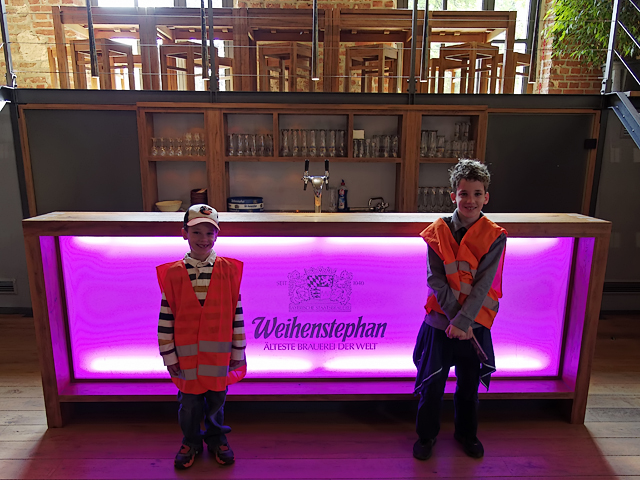
Our guide was no ordinary tourist baby-sitter. He had already graduated from the Technical University of Munich with his brewing degree, and was now working on his PhD in nanofilters (with brewing application, or course)!
Our first stop was the mash house. The thing that really impressed me was the incredible information and detail the guide gave -- we spent at least 20 minutes here, while he described the process in depth. In fact, he asked who was a homebrewer. One guy in our group was, and the guide went into complex chemistry points for him, about the steps in the process (removing certain byproducts, impact of other variables on the taste...). He's a real expert!
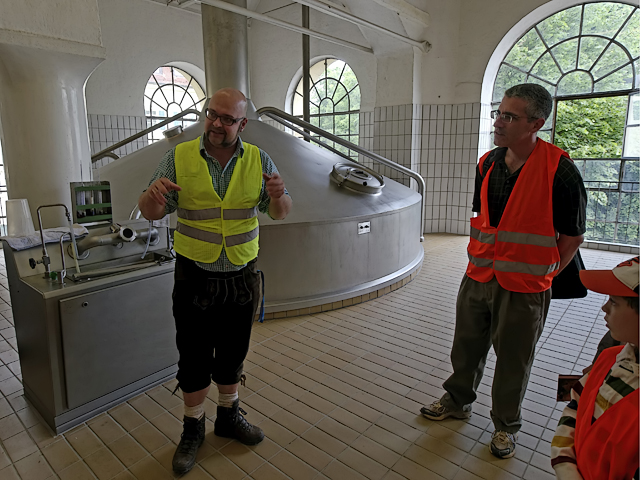
The brewery was built on a hill, typical for "castles" hundreds of years ago. There is also a spring 300m below from which the brewery gets its water, but today the cost of brewing on a hill is higher (e.g. water pumping, shipping).
We looked into the stainless steel kettles to see the mashing process in action. (Our guide also explained why stainless steel is best, despite the traditional use of copper.) I wish I had not been so busy snapping photographs...
I missed a lot of his detailed / science points about the brewing process. Clearly I have to take the tour again...
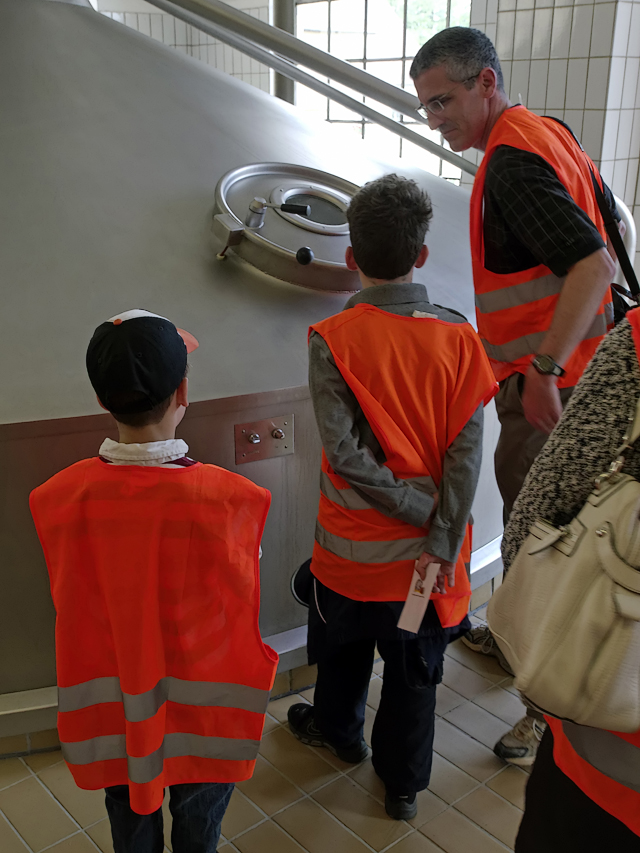
One of the boys needed a little help in order to look into the kettles:
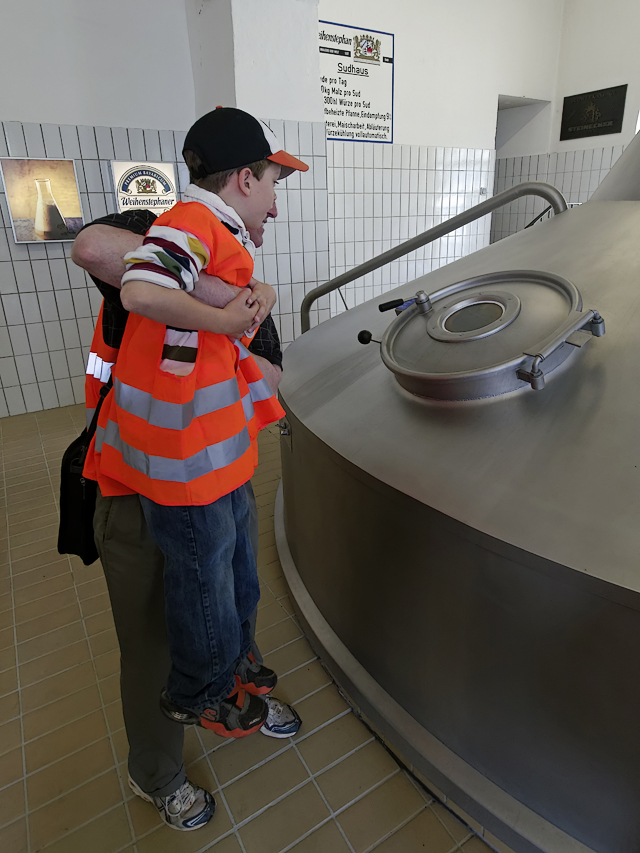
From the mashing room we moved to the fermenting room:
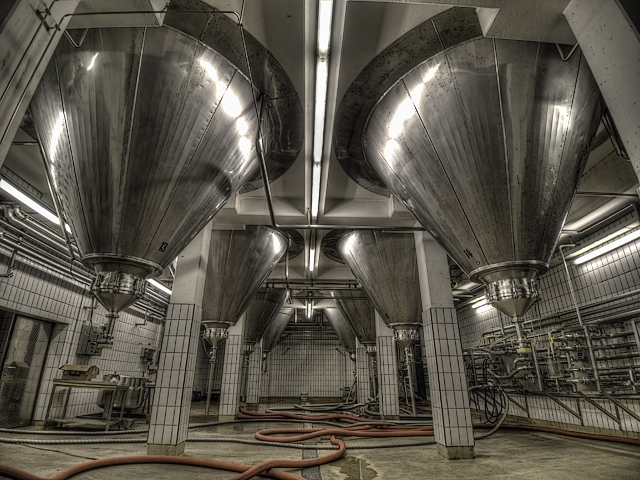 Note: above photo was bracketed and HDR/tonemapped using Photomatix
Note: above photo was bracketed and HDR/tonemapped using Photomatix
After the fermenting room, it was on to the bottling and kegging (and warehouse & shipping) area.
One difference between the U.S. and Germany is reusable bottles. The U.S. recycles glass after one use, if I heard it correctly. The bottles in Germany can be reused a dozen times or so (higher standards of wear). But this means that they have to be collected, cleaned & shipped. this video shows workers loading them onto the filling line:
Before filling, of course, bottles are cleaned both inside and out. The cleaning process takes only about 2 shots of water per bottle, so it is quite efficient! Any residual label paper is collected and spit out by this machine:
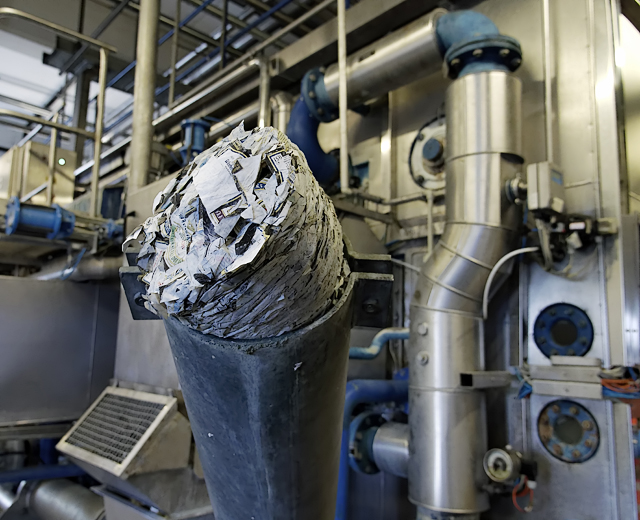
The plastic crates in which bottles are shipped are also washed by another gravity-fed machine:
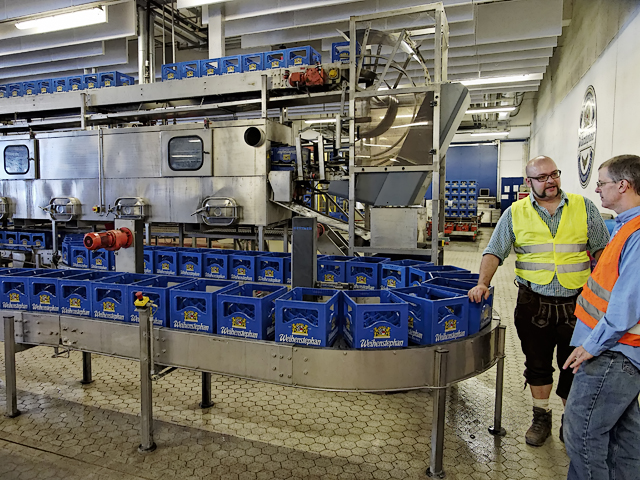
Clean bottles line up on conveyors before the filling station:
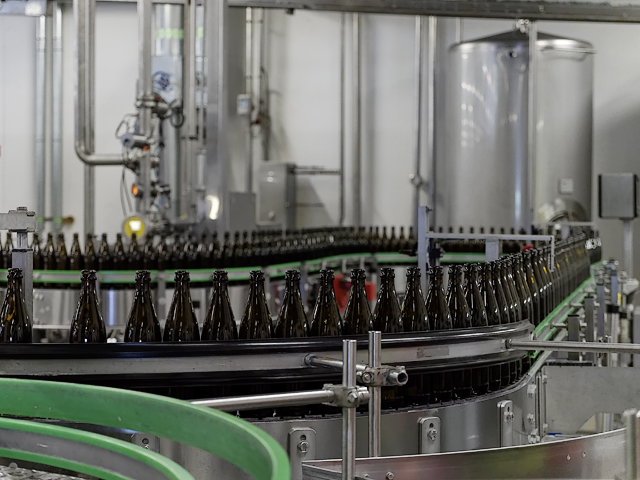
This video tries to show a little of everything going on: bottles on their way to the cleaning maching in the foreground. In the background: crates and clean bottles moving towards the filling machines.
Finally, we saw the warehouse. The yellow cases are Kirin Ichiban! Weihenstephan brews it for them here:
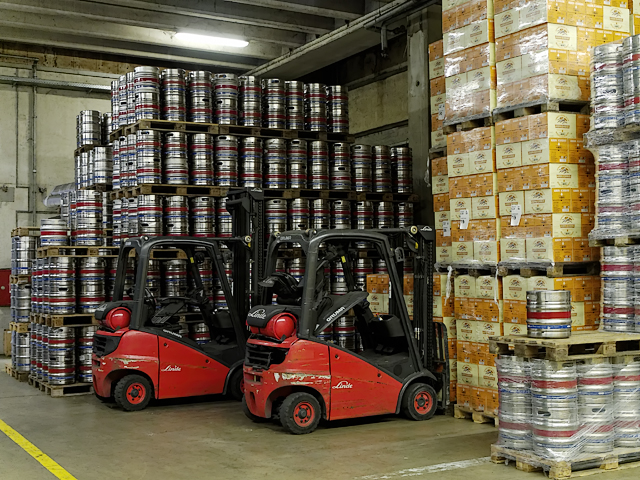
The kegs are filled nearby. A robot arm grabs four empty at a time for filling, then stacks them automatically:
After the tour's end, we headed to the biergarten for lunch and some beer, of course:
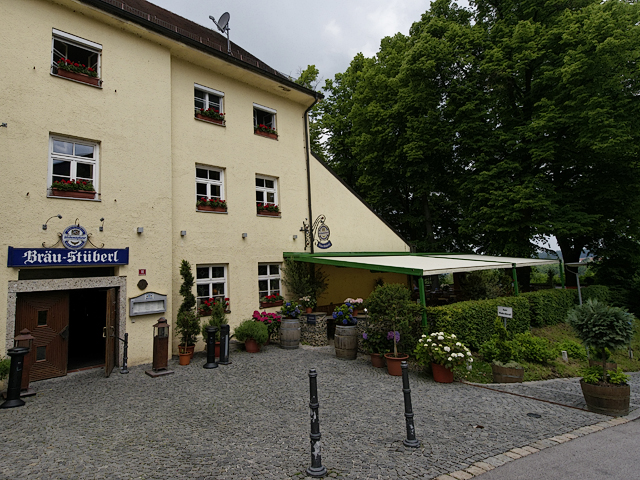
The biergarten is small but lovely. The view atop the hill is nice. Plus, our guide joined us for a beer!
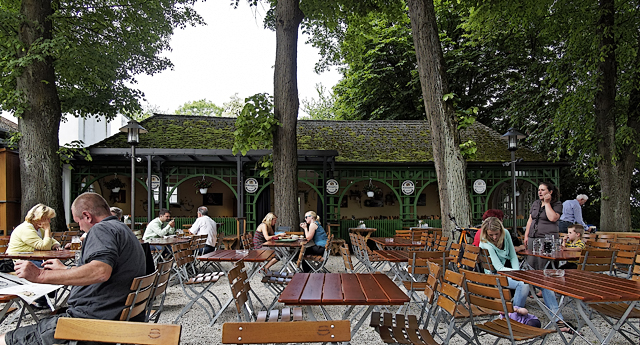
As a bonus, Weihenstephan provides water for any dogs you bring to their biergarten:
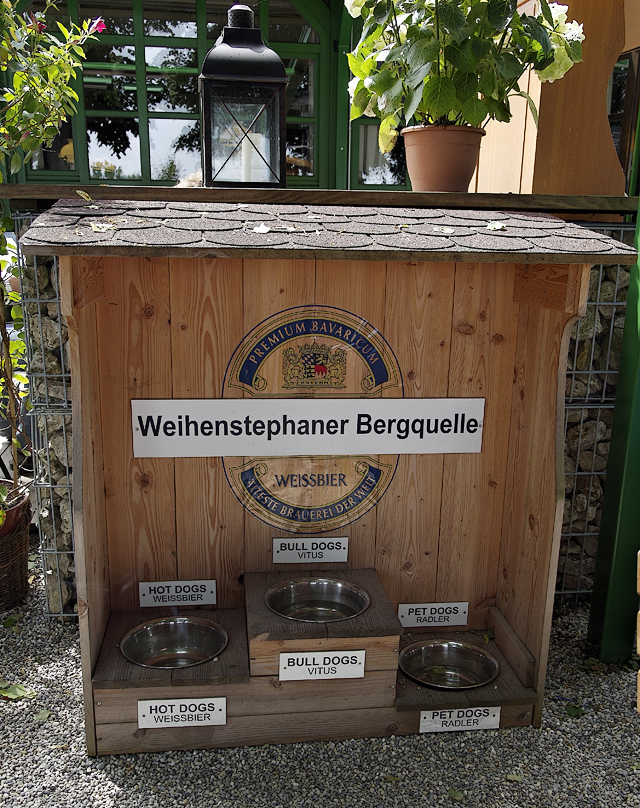
It was a great tour, especially because the guide was a real expert and so friendly as to join us afterwards!
It is a highly recommended activity when you're in Munich, especially as a last-minute pre-airport event.
 Herr J ...
Herr J ...  Post a Comment
Post a Comment 



